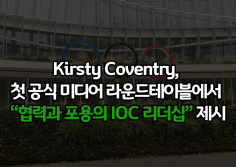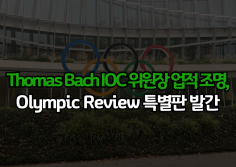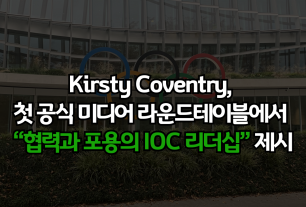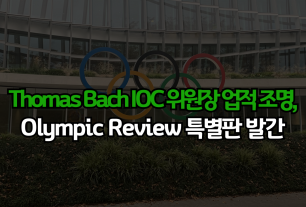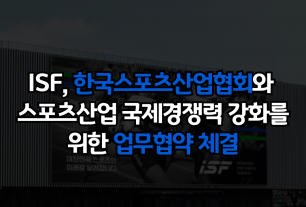[공유] (Yonhap Interview) IOC President Thomas Bach hoping to watch joint Korean hockey team -- as neutral
2018-02-05
14:44:42
By Yoo Jee-ho
PYEONGCHANG, South Korea, Jan. 31 (Yonhap) -- International Olympic Committee (IOC) President Thomas Bach isn't just one of the most influential figures in the world of sports -- he's ever the diplomat, as well.
Bach was instrumental in making the historic South-North Korean joint women's ice hockey team possible for the upcoming PyeongChang Winter Olympics. The Koreas reached a bilateral agreement on the unified team first, and then Bach chaired a meeting at the IOC's headquarters in Lausanne, Switzerland, on Jan. 20 to approve the deal.
It has created an unprecedented situation where 12 North Koreans have joined 23 South Korean players. The Koreas have never had a single team in any sport at the Olympic Games.
 International Olympic Committee President Thomas Bach speaks to Yonhap News Agency in an interview in PyeongChang, Gangwon Province, on Jan. 31, 2018. (Yonhap)
The women's team will play its momentous first game against Switzerland at 9:10 p.m. on Feb. 10 at Kwandong Hockey Centre in Gangneung, just east of PyeongChang. It's one day after the opening ceremony, and Bach said he's hoping to attend the game.
"I hope I will be able to watch the first match there for the unified team against Switzerland," Bach said in an interview with Yonhap News Agency on Wednesday in PyeongChang. "My office is working on this to make it happen. I hope they will come up with a positive result."
The joint team will play under the name Korea, and will wear a uniform featuring the Korean Unification Flag, which bears the image of a blue Korean Peninsula against white background.
Asked whether he will be waving the flag in support of the team that is his legacy, Bach pointed out that the IOC is actually headquartered in Switzerland.
"Cheering for one team, this may cause some problems in Switzerland," Bach said with a smile. "Switzerland being the host country of the IOC, I think I'd better behave."
Bach also lauded the players from both sides for making the efforts to come together, after they were asked to start training together so close to the start of the Olympics. Bach said he had been following the news of the team and knew that the players threw a birthday party for a North Korean player, Jin Ok, on Monday.
"This is exactly what the Olympic Games and Olympic spirit are about," he said. "You can see at the beginning that there may have been some skepticism among each other. These players from (North Korea) arrived, and they got to know each other. They were training together, and a couple of days later, they were celebrating birthday in such a way. If someone asks you, 'What's the Olympic spirit?' This is it."
Bach, who was born in West Germany before the two Germanies were united, also spoke at length about the mixed response in South Korea to the joint hockey team and joint Korean march at the opening ceremony of the PyeongChang Olympics.
Critics of the joint team said South Korean players were unfairly being asked to cede their playing opportunities to make room for North Koreans. And there were those who have expressed their misgivings about a joint march behind the Korean Unification Flag, instead of South Korea's own national flag.
Bach insisted the world is now anticipating "this powerful message of peace which can be sent by the unified march." Then, talking about his personal experience of growing up as an athlete in formerly divided Germany, Bach said not everyone was pleased with joint German Olympic teams in the past, either.
Bach won a team gold medal in men's foil for West Germany at the 1976 Olympics.
"In such a situation of a divided country, a part of the population has only seen the country being divided and doesn't have the experience of being one nation," he said. "You need to explain and you need to look into the future. You need to put it into perspective of the overall development of the world. You cannot expect 100 percent support from the very beginning."
Bach also said the IOC will continue to cooperate with the two Koreas so that inter-Korean sports cooperation will extend beyond the PyeongChang Olympics.
"We're also there to build bridges among people and to enable people to get to know each other," he said. "Experience shows that when people get to know each other, they can become friends. Then they can understand each other much better. Through dialogue, they can come to peaceful solutions."
During the talks with the Koreas in Lausanne, Bach also received an invitation from North Korea to pay a visit and didn't rule out a future trip.
"I was very, very pleased that the other participants of this meeting were welcoming this invitation," Bach said. "The invitation has been issued for a convenient date. We'll now speak with the national Olympic committee of (North Korea) what this convenient date can be."
International Olympic Committee President Thomas Bach speaks to Yonhap News Agency in an interview in PyeongChang, Gangwon Province, on Jan. 31, 2018. (Yonhap)
The women's team will play its momentous first game against Switzerland at 9:10 p.m. on Feb. 10 at Kwandong Hockey Centre in Gangneung, just east of PyeongChang. It's one day after the opening ceremony, and Bach said he's hoping to attend the game.
"I hope I will be able to watch the first match there for the unified team against Switzerland," Bach said in an interview with Yonhap News Agency on Wednesday in PyeongChang. "My office is working on this to make it happen. I hope they will come up with a positive result."
The joint team will play under the name Korea, and will wear a uniform featuring the Korean Unification Flag, which bears the image of a blue Korean Peninsula against white background.
Asked whether he will be waving the flag in support of the team that is his legacy, Bach pointed out that the IOC is actually headquartered in Switzerland.
"Cheering for one team, this may cause some problems in Switzerland," Bach said with a smile. "Switzerland being the host country of the IOC, I think I'd better behave."
Bach also lauded the players from both sides for making the efforts to come together, after they were asked to start training together so close to the start of the Olympics. Bach said he had been following the news of the team and knew that the players threw a birthday party for a North Korean player, Jin Ok, on Monday.
"This is exactly what the Olympic Games and Olympic spirit are about," he said. "You can see at the beginning that there may have been some skepticism among each other. These players from (North Korea) arrived, and they got to know each other. They were training together, and a couple of days later, they were celebrating birthday in such a way. If someone asks you, 'What's the Olympic spirit?' This is it."
Bach, who was born in West Germany before the two Germanies were united, also spoke at length about the mixed response in South Korea to the joint hockey team and joint Korean march at the opening ceremony of the PyeongChang Olympics.
Critics of the joint team said South Korean players were unfairly being asked to cede their playing opportunities to make room for North Koreans. And there were those who have expressed their misgivings about a joint march behind the Korean Unification Flag, instead of South Korea's own national flag.
Bach insisted the world is now anticipating "this powerful message of peace which can be sent by the unified march." Then, talking about his personal experience of growing up as an athlete in formerly divided Germany, Bach said not everyone was pleased with joint German Olympic teams in the past, either.
Bach won a team gold medal in men's foil for West Germany at the 1976 Olympics.
"In such a situation of a divided country, a part of the population has only seen the country being divided and doesn't have the experience of being one nation," he said. "You need to explain and you need to look into the future. You need to put it into perspective of the overall development of the world. You cannot expect 100 percent support from the very beginning."
Bach also said the IOC will continue to cooperate with the two Koreas so that inter-Korean sports cooperation will extend beyond the PyeongChang Olympics.
"We're also there to build bridges among people and to enable people to get to know each other," he said. "Experience shows that when people get to know each other, they can become friends. Then they can understand each other much better. Through dialogue, they can come to peaceful solutions."
During the talks with the Koreas in Lausanne, Bach also received an invitation from North Korea to pay a visit and didn't rule out a future trip.
"I was very, very pleased that the other participants of this meeting were welcoming this invitation," Bach said. "The invitation has been issued for a convenient date. We'll now speak with the national Olympic committee of (North Korea) what this convenient date can be."
 International Olympic Committee President Thomas Bach speaks to Yonhap News Agency in an interview in PyeongChang, Gangwon Province, on Jan. 31, 2018. (Yonhap)
Bach arrived in PyeongChang on Tuesday and met with Olympic volunteers and South Korean athletes, before meeting with the Games' organizing officials.
PyeongChang 2018 will be Bach's third Olympics since becoming IOC's president in 2013. The two previous Olympics, Sochi 2014 and Rio 2016, both had to deal with "white elephants," referring to empty Olympic venues left mostly unused despite the major investment that went into their construction.
Bach acknowledged that planning for post-Olympics use of PyeongChang venues -- also referred to as Olympic legacy planning -- has been among the main issues that the IOC's Coordination Commission on PyeongChang has faced.
"A number of these legacy plans have been delivered, but there is also still some work to do," Bach said. "We're expecting in the next couple of days there is still some more information about these legacy plans for the sports facilities."
Bach also chose to look at more positive development, noting that the apartments built to be used as athletes' living quarters have been sold out for residents to move in after the Olympics.
"This is a very positive signal and it's also encouraging for the legacy plans for the sports facilities," Bach said. "If people are buying apartments, it means they're coming here and they'll use the facilities."
For the most part, the preparations for the Olympics are "going very smoothly," Bach said.
"Right now, we're in a really excellent situation," he said. "There are no major challenges at this moment in time."
jeeho@yna.co.kr
원문보기 : http://m.yna.co.kr/mob2/en/contents_en.jsp?cid=AEN20180131010300315&sns=fb&site=0200000000&mobile
International Olympic Committee President Thomas Bach speaks to Yonhap News Agency in an interview in PyeongChang, Gangwon Province, on Jan. 31, 2018. (Yonhap)
Bach arrived in PyeongChang on Tuesday and met with Olympic volunteers and South Korean athletes, before meeting with the Games' organizing officials.
PyeongChang 2018 will be Bach's third Olympics since becoming IOC's president in 2013. The two previous Olympics, Sochi 2014 and Rio 2016, both had to deal with "white elephants," referring to empty Olympic venues left mostly unused despite the major investment that went into their construction.
Bach acknowledged that planning for post-Olympics use of PyeongChang venues -- also referred to as Olympic legacy planning -- has been among the main issues that the IOC's Coordination Commission on PyeongChang has faced.
"A number of these legacy plans have been delivered, but there is also still some work to do," Bach said. "We're expecting in the next couple of days there is still some more information about these legacy plans for the sports facilities."
Bach also chose to look at more positive development, noting that the apartments built to be used as athletes' living quarters have been sold out for residents to move in after the Olympics.
"This is a very positive signal and it's also encouraging for the legacy plans for the sports facilities," Bach said. "If people are buying apartments, it means they're coming here and they'll use the facilities."
For the most part, the preparations for the Olympics are "going very smoothly," Bach said.
"Right now, we're in a really excellent situation," he said. "There are no major challenges at this moment in time."
jeeho@yna.co.kr
원문보기 : http://m.yna.co.kr/mob2/en/contents_en.jsp?cid=AEN20180131010300315&sns=fb&site=0200000000&mobile
 International Olympic Committee President Thomas Bach speaks to Yonhap News Agency in an interview in PyeongChang, Gangwon Province, on Jan. 31, 2018. (Yonhap)
The women's team will play its momentous first game against Switzerland at 9:10 p.m. on Feb. 10 at Kwandong Hockey Centre in Gangneung, just east of PyeongChang. It's one day after the opening ceremony, and Bach said he's hoping to attend the game.
"I hope I will be able to watch the first match there for the unified team against Switzerland," Bach said in an interview with Yonhap News Agency on Wednesday in PyeongChang. "My office is working on this to make it happen. I hope they will come up with a positive result."
The joint team will play under the name Korea, and will wear a uniform featuring the Korean Unification Flag, which bears the image of a blue Korean Peninsula against white background.
Asked whether he will be waving the flag in support of the team that is his legacy, Bach pointed out that the IOC is actually headquartered in Switzerland.
"Cheering for one team, this may cause some problems in Switzerland," Bach said with a smile. "Switzerland being the host country of the IOC, I think I'd better behave."
Bach also lauded the players from both sides for making the efforts to come together, after they were asked to start training together so close to the start of the Olympics. Bach said he had been following the news of the team and knew that the players threw a birthday party for a North Korean player, Jin Ok, on Monday.
"This is exactly what the Olympic Games and Olympic spirit are about," he said. "You can see at the beginning that there may have been some skepticism among each other. These players from (North Korea) arrived, and they got to know each other. They were training together, and a couple of days later, they were celebrating birthday in such a way. If someone asks you, 'What's the Olympic spirit?' This is it."
Bach, who was born in West Germany before the two Germanies were united, also spoke at length about the mixed response in South Korea to the joint hockey team and joint Korean march at the opening ceremony of the PyeongChang Olympics.
Critics of the joint team said South Korean players were unfairly being asked to cede their playing opportunities to make room for North Koreans. And there were those who have expressed their misgivings about a joint march behind the Korean Unification Flag, instead of South Korea's own national flag.
Bach insisted the world is now anticipating "this powerful message of peace which can be sent by the unified march." Then, talking about his personal experience of growing up as an athlete in formerly divided Germany, Bach said not everyone was pleased with joint German Olympic teams in the past, either.
Bach won a team gold medal in men's foil for West Germany at the 1976 Olympics.
"In such a situation of a divided country, a part of the population has only seen the country being divided and doesn't have the experience of being one nation," he said. "You need to explain and you need to look into the future. You need to put it into perspective of the overall development of the world. You cannot expect 100 percent support from the very beginning."
Bach also said the IOC will continue to cooperate with the two Koreas so that inter-Korean sports cooperation will extend beyond the PyeongChang Olympics.
"We're also there to build bridges among people and to enable people to get to know each other," he said. "Experience shows that when people get to know each other, they can become friends. Then they can understand each other much better. Through dialogue, they can come to peaceful solutions."
During the talks with the Koreas in Lausanne, Bach also received an invitation from North Korea to pay a visit and didn't rule out a future trip.
"I was very, very pleased that the other participants of this meeting were welcoming this invitation," Bach said. "The invitation has been issued for a convenient date. We'll now speak with the national Olympic committee of (North Korea) what this convenient date can be."
International Olympic Committee President Thomas Bach speaks to Yonhap News Agency in an interview in PyeongChang, Gangwon Province, on Jan. 31, 2018. (Yonhap)
The women's team will play its momentous first game against Switzerland at 9:10 p.m. on Feb. 10 at Kwandong Hockey Centre in Gangneung, just east of PyeongChang. It's one day after the opening ceremony, and Bach said he's hoping to attend the game.
"I hope I will be able to watch the first match there for the unified team against Switzerland," Bach said in an interview with Yonhap News Agency on Wednesday in PyeongChang. "My office is working on this to make it happen. I hope they will come up with a positive result."
The joint team will play under the name Korea, and will wear a uniform featuring the Korean Unification Flag, which bears the image of a blue Korean Peninsula against white background.
Asked whether he will be waving the flag in support of the team that is his legacy, Bach pointed out that the IOC is actually headquartered in Switzerland.
"Cheering for one team, this may cause some problems in Switzerland," Bach said with a smile. "Switzerland being the host country of the IOC, I think I'd better behave."
Bach also lauded the players from both sides for making the efforts to come together, after they were asked to start training together so close to the start of the Olympics. Bach said he had been following the news of the team and knew that the players threw a birthday party for a North Korean player, Jin Ok, on Monday.
"This is exactly what the Olympic Games and Olympic spirit are about," he said. "You can see at the beginning that there may have been some skepticism among each other. These players from (North Korea) arrived, and they got to know each other. They were training together, and a couple of days later, they were celebrating birthday in such a way. If someone asks you, 'What's the Olympic spirit?' This is it."
Bach, who was born in West Germany before the two Germanies were united, also spoke at length about the mixed response in South Korea to the joint hockey team and joint Korean march at the opening ceremony of the PyeongChang Olympics.
Critics of the joint team said South Korean players were unfairly being asked to cede their playing opportunities to make room for North Koreans. And there were those who have expressed their misgivings about a joint march behind the Korean Unification Flag, instead of South Korea's own national flag.
Bach insisted the world is now anticipating "this powerful message of peace which can be sent by the unified march." Then, talking about his personal experience of growing up as an athlete in formerly divided Germany, Bach said not everyone was pleased with joint German Olympic teams in the past, either.
Bach won a team gold medal in men's foil for West Germany at the 1976 Olympics.
"In such a situation of a divided country, a part of the population has only seen the country being divided and doesn't have the experience of being one nation," he said. "You need to explain and you need to look into the future. You need to put it into perspective of the overall development of the world. You cannot expect 100 percent support from the very beginning."
Bach also said the IOC will continue to cooperate with the two Koreas so that inter-Korean sports cooperation will extend beyond the PyeongChang Olympics.
"We're also there to build bridges among people and to enable people to get to know each other," he said. "Experience shows that when people get to know each other, they can become friends. Then they can understand each other much better. Through dialogue, they can come to peaceful solutions."
During the talks with the Koreas in Lausanne, Bach also received an invitation from North Korea to pay a visit and didn't rule out a future trip.
"I was very, very pleased that the other participants of this meeting were welcoming this invitation," Bach said. "The invitation has been issued for a convenient date. We'll now speak with the national Olympic committee of (North Korea) what this convenient date can be."
 International Olympic Committee President Thomas Bach speaks to Yonhap News Agency in an interview in PyeongChang, Gangwon Province, on Jan. 31, 2018. (Yonhap)
Bach arrived in PyeongChang on Tuesday and met with Olympic volunteers and South Korean athletes, before meeting with the Games' organizing officials.
PyeongChang 2018 will be Bach's third Olympics since becoming IOC's president in 2013. The two previous Olympics, Sochi 2014 and Rio 2016, both had to deal with "white elephants," referring to empty Olympic venues left mostly unused despite the major investment that went into their construction.
Bach acknowledged that planning for post-Olympics use of PyeongChang venues -- also referred to as Olympic legacy planning -- has been among the main issues that the IOC's Coordination Commission on PyeongChang has faced.
"A number of these legacy plans have been delivered, but there is also still some work to do," Bach said. "We're expecting in the next couple of days there is still some more information about these legacy plans for the sports facilities."
Bach also chose to look at more positive development, noting that the apartments built to be used as athletes' living quarters have been sold out for residents to move in after the Olympics.
"This is a very positive signal and it's also encouraging for the legacy plans for the sports facilities," Bach said. "If people are buying apartments, it means they're coming here and they'll use the facilities."
For the most part, the preparations for the Olympics are "going very smoothly," Bach said.
"Right now, we're in a really excellent situation," he said. "There are no major challenges at this moment in time."
jeeho@yna.co.kr
원문보기 : http://m.yna.co.kr/mob2/en/contents_en.jsp?cid=AEN20180131010300315&sns=fb&site=0200000000&mobile
International Olympic Committee President Thomas Bach speaks to Yonhap News Agency in an interview in PyeongChang, Gangwon Province, on Jan. 31, 2018. (Yonhap)
Bach arrived in PyeongChang on Tuesday and met with Olympic volunteers and South Korean athletes, before meeting with the Games' organizing officials.
PyeongChang 2018 will be Bach's third Olympics since becoming IOC's president in 2013. The two previous Olympics, Sochi 2014 and Rio 2016, both had to deal with "white elephants," referring to empty Olympic venues left mostly unused despite the major investment that went into their construction.
Bach acknowledged that planning for post-Olympics use of PyeongChang venues -- also referred to as Olympic legacy planning -- has been among the main issues that the IOC's Coordination Commission on PyeongChang has faced.
"A number of these legacy plans have been delivered, but there is also still some work to do," Bach said. "We're expecting in the next couple of days there is still some more information about these legacy plans for the sports facilities."
Bach also chose to look at more positive development, noting that the apartments built to be used as athletes' living quarters have been sold out for residents to move in after the Olympics.
"This is a very positive signal and it's also encouraging for the legacy plans for the sports facilities," Bach said. "If people are buying apartments, it means they're coming here and they'll use the facilities."
For the most part, the preparations for the Olympics are "going very smoothly," Bach said.
"Right now, we're in a really excellent situation," he said. "There are no major challenges at this moment in time."
jeeho@yna.co.kr
원문보기 : http://m.yna.co.kr/mob2/en/contents_en.jsp?cid=AEN20180131010300315&sns=fb&site=0200000000&mobile
최근뉴스
최근뉴스
HOT 뉴스

